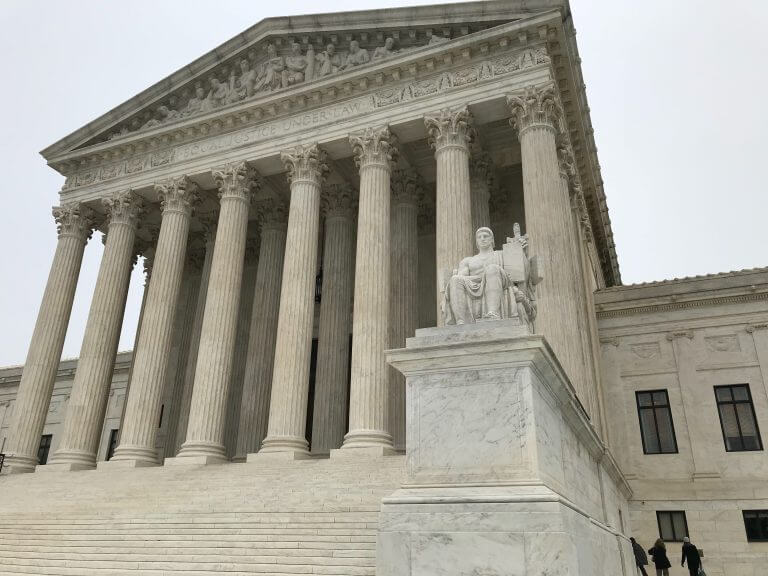
WASHINGTON (GA Recorder) — The Supreme Court is weighing potentially sweeping changes to the right to an abortion, after two hours of arguments Wednesday morning on a Mississippi law that bans most abortions after 15 weeks of pregnancy.
The court’s conservatives, who hold a 6-3 majority, appeared through their questions to be sympathetic to Mississippi’s arguments that its law should be upheld — and they also seemed open to the possibility of undoing other precedent-setting abortion cases.
Supporters of the Mississippi law argued not only that it should be upheld, but that two key cases that have determined when a woman has the right to seek an abortion also should be overturned: the 1973 Roe v. Wade decision as well as the 1992 Planned Parenthood v. Casey ruling.
That would allow states to decide if they want to allow the medical procedure within their borders, the lawyers contended.
“When an issue affects everyone, and when the Constitution does not take sides on it, it belongs to the people,” said Mississippi Solicitor General Scott Stewart, arguing that the precedents set in prior landmark abortion cases “have failed.”
Attorneys arguing on behalf of Mississippi’s only abortion clinic and of the federal government told the justices that the right to an abortion was correctly established in the Roe v. Wade decision and then reaffirmed in the Planned Parenthood v. Casey ruling.
Undoing that right would have devastating consequences for people seeking abortions throughout the country, they said.
If they wholesale overturn Roe, it could be the case that Georgia would be able to outright ban abortions which the existing laws on the books don’t do – Anthony Michael Kreis, a law professor at Georgia State University
Some may be forced to travel out of state to seek care. If they lack the money and time off from work to do so, they may have no option beyond carrying a child to term, even if it is not in their best interest or that of their family, the lawyers said.
“There is no less need now than there was 30 years or 50 years ago for women to be able to make this fundamental choice for themselves about their bodies, lives and health,” said Julie Rickelman, senior director of litigation at the Center for Reproductive Rights.
“Why is 15 weeks not enough time?” Chief Justice John Roberts asked Rickelman.
She noted that the Mississippi law would ban most abortions nine weeks earlier than the current legal standard, giving patients less time to navigate an array of regulatory barriers that some states have enacted to make it harder to seek an abortion.
The Roe decision established a legal right to an abortion during the first two trimesters of pregnancy, or 26 weeks. In the Casey decision, the court ruled that people can obtain an abortion until viability, or the point when a fetus can survive outside the womb — generally about 24 weeks.
The case argued Wednesday is Dobbs v. Jackson Women’s Health.
Ramifications for dozens of states
Wednesday’s hearing came after the top court already has been grappling with abortion rights.
Since announcing in May that the justices would take up the Mississippi case, the court has heard arguments over a Texas law designed to skirt the court’s past decisions and ban abortions about six weeks after a woman’s last menstrual cycle.
The pair of legal battles has thrust the contentious social issue back into the national spotlight, and thousands of activists in both support of and opposition to abortion rights flooded the sidewalks around the court on Wednesday to chant and wave signs.
The pending abortion case could spur a cascade of legal changes across two dozen states if justices back the restrictive Mississippi law — and potentially dismantle the landmark 1973 ruling affirming the right to an abortion.
A dozen states — including Louisiana, Tennessee, Missouri and Idaho — have “trigger laws” that would go into effect banning abortions if Roe v. Wade is overturned, according to the Guttmacher Institute, an organization focused on reproductive health and rights.
Michigan, Wisconsin, Arizona and five others still have abortion bans that pre-date Roe v. Wade on the books, which would become enforceable again if the case is overturned.
Wednesday’s oral arguments were also closely watched back in Georgia, where the fate of the state’s anti-abortion law is tied to the court’s decision on the Mississippi measure. Georgia’s law was ruled unconstitutional last year and has never taken effect. A panel of three judges decided in September to wait for the U.S. Supreme Court to act before addressing the state of Georgia’s appeal.
“Georgia is a state that values the lives of the unborn. Our family joins thousands of pro-life conservatives across the country today in prayer as the U.S Supreme Court takes up the Dobbs case,” Republican Gov. Brian Kemp tweeted shortly before oral arguments began.
Georgia’s 2019 law would outlaw most abortions once fetal cardiac activity is detected, which is typically about six weeks into a pregnancy and before many women know they are pregnant. Today, women in Georgia can have an abortion up to 20 weeks into a pregnancy. The state’s contested measure also includes other provisions, such as a tax break for expecting parents.
But that probably would not be where it ends, Kreis said.
“If they wholesale overturn Roe, it could be the case that Georgia would be able to outright ban abortions which the existing laws on the books don’t do,” Kreis said.
For example, Kreis said Georgia lawmakers could take up their own trigger law. One influential GOP lawmaker who is seeking higher office has also already said he plans to file a bill that would mirror parts of Texas’ law.
This all means, Kreis said, that abortion will likely be at the center of next year’s elections.
“No matter what the court does – and it seems as if the court is going to redraw that line somewhere – legislators in this state, and in many others, will do their utmost to reach that line to its fullest and try to push that line back even further,” he said. “We are just in for a very ugly few years if that’s the case, particularly in a state that is so evenly divided statewide as Georgia. It’s just not an issue that going to go away.
“If folks thought 2019 was unpleasant, then I think they’re about to get 2019 on steroids,” he said, referring to the bitter debate over Georgia’s law.
Dr. Nisha Verma, an obstetrician-gynecologist who practices at Emory University, participated in a demonstration outside the court Wednesday and said she regularly attends local protests in support of abortion access. She said she is worried about what will happen in her state if Roe is overturned.
Many of her patients don’t know until their second or third trimester that they or their fetus have developed a medical issue that requires terminating a pregnancy, Verma said.
“A lot of times this is an act of compassion, that people are trying to do the right thing in their pregnancy or [for] their existing children,” she said.
Debate over precedents
During Wednesday’s arguments, the court’s liberal members repeatedly emphasized the implications of undoing the prior rulings.
“Will this institution survive the stench that this creates in the public perception that the Constitution and its reading are just political acts?” Justice Sonia Sotomayor asked at one point.
Justice Brett Kavanaugh, one of the justices appointed by former President Donald Trump, giving the court its conservative majority, noted that if the Mississippi law is upheld, states would not be barred from allowing abortion.
He listed a long line of major cases in which the Supreme Court overruled precedents, including Brown v. Board of Education, which found that racial segregation in schools violated the Constitution.
If the court had adhered to its earlier decisions in those cases, Kavanaugh said, “the country would be a much different place.”
Solicitor General Elizabeth Prelogar underscored how deeply the Roe decision has been woven into everyday American life, noting that while some people don’t agree with the decision, they know what the court ruled and what it means if they have an unintended pregnancy.
“For the court to reverse course now, I think would run counter to that societal reliance and the very concept we have of what equality is guaranteed to women in this country,” Prelogar said.
Jill Nolin contributed to this report







